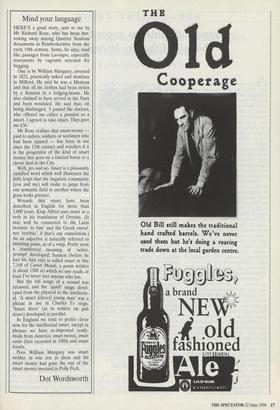Mind your language
HERE'S a good story, sent to me by Mr Richard Rose, who has been bur- rowing away among Quarter Sessions documents in Pembrokeshire from the early 19th century. Some, he says, read like passages from Lavengro, especially statements by vagrants arrested for begging.
One is by William Mangney, arrested in 1822, practically naked and destitute in Milford. He said he was a Mexican and that all his clothes had been stolen by a Russian in a lodging-house. He also claimed to have served in the Navy and been wounded. He said that, on being discharged, 'I passed the doctors, who offered me either a pension or a smart. I agreed to take smart. They gave me £36.'
Mr Rose realises that smart-money paid to sailors, soldiers or workmen who had been injured — has been in use since the 17th century and wonders if it is the progenitor of the kind of smart money that goes on a fancied horse or a clever deal in the City.
Well, yes and no. Smart is a pleasantly ramified word which well illustrates the little leaps that the linguistic community (you and me) will make to jump from one semantic field to another where the grass looks greener.
Wounds that ' smart have been described in English for more than 1,000 years. King Alfred uses smart as a verb in his translation of Orosius. (It may well be connected to the Latin mordere 'to bite' and the Greek smerd- nos 'terrible', if that's any consolation.) As an adjective it naturally referred to smarting pains, as of a whip. Pretty soon a transferred meaning of 'active, prompt' developed; Samson (before he had his hair cut) is called smart in line 7,168 of Cursor Mundi, a poem written in about 1300 AD which no one reads, at least I've never met anyone who has.
But the old usage of a wound was retained, and the 'quick' usage devel- oped from the physical to the intellectu- al. 'A smart [clever] young man' was a phrase in use in Charles I's reign. `Smart dress' (as in notices on pub doors) developed in parallel.
In England we tend to prefer clever now for the intellectual smart, except in phrases we have re-imported ready- made from America: smart money, smart cards (first recorded in 1980) and smart bombs.
Poor William Mangney was smart neither in wits nor in dress and his smart money had gone the way of the smart money invested in Polly Peck.
Dot Wordsworth


























































 Previous page
Previous page